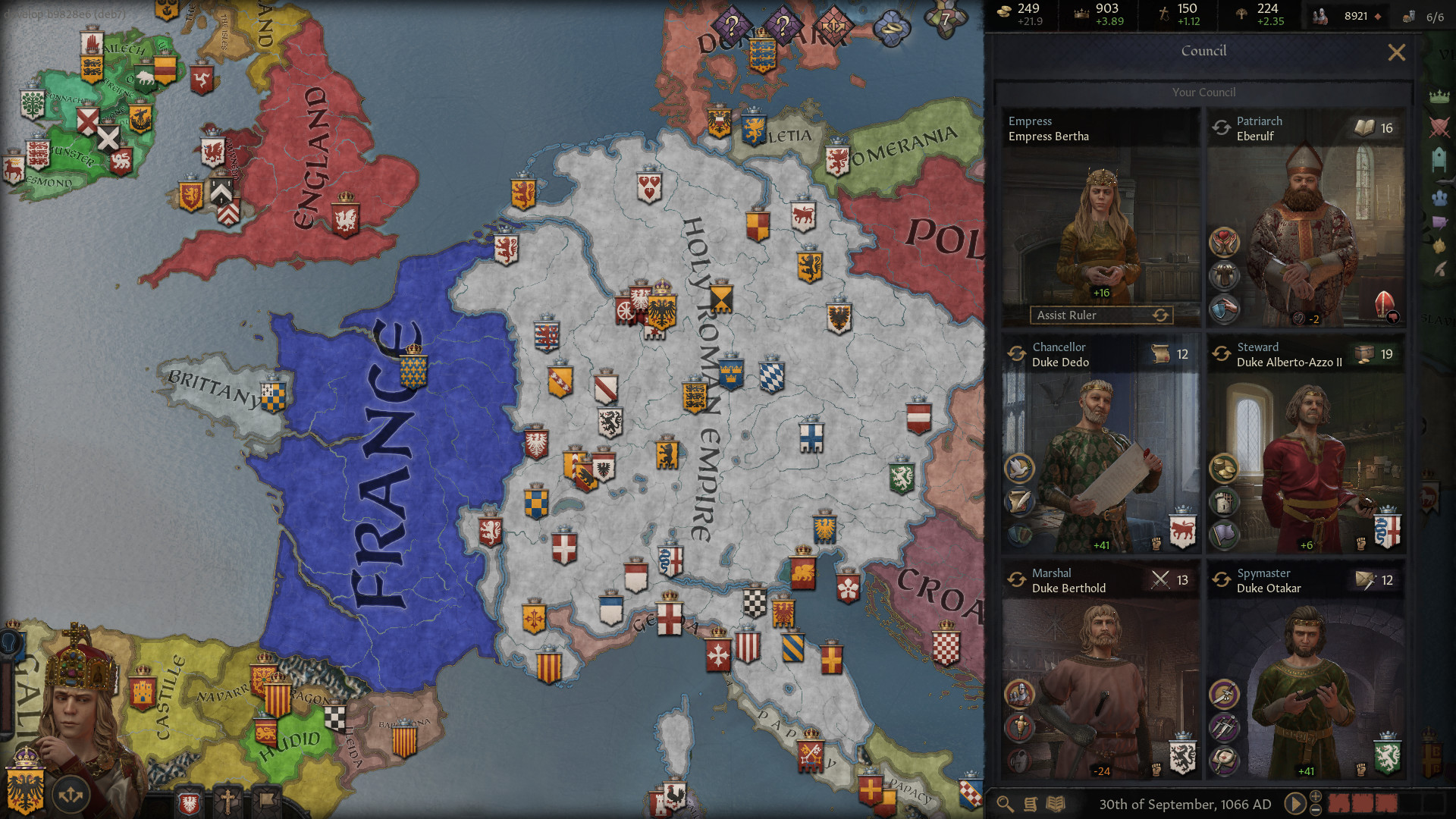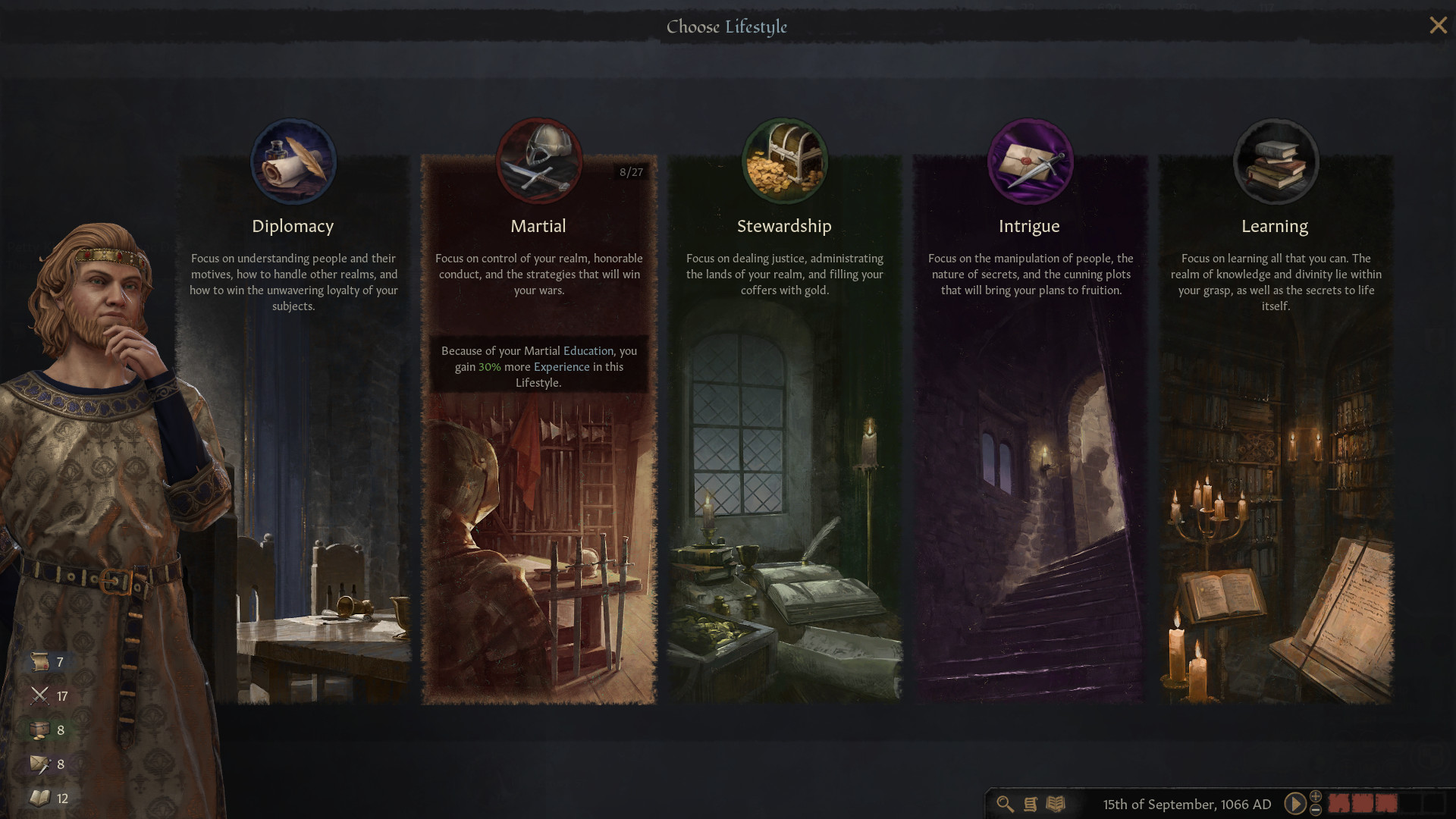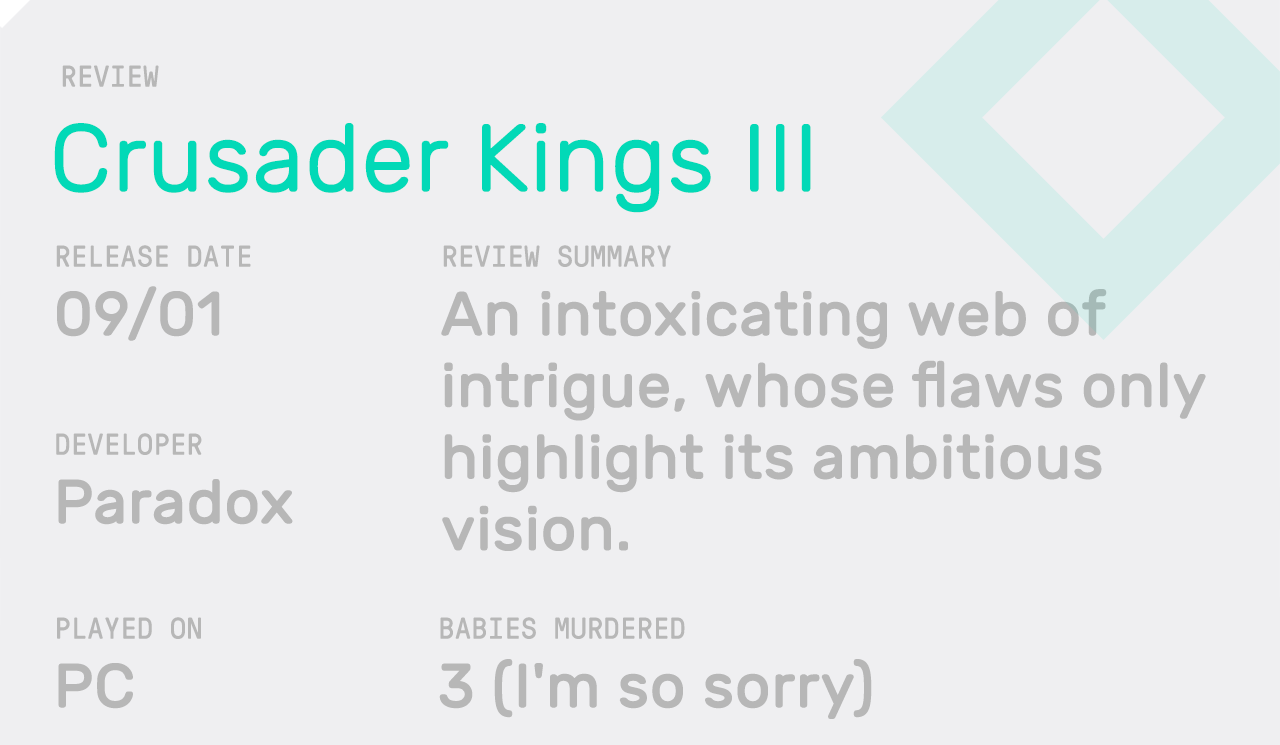Crusader Kings III is massively, powerfully alive. You can almost feel it pulsing when you play it. Often, deep into the third, fourth, fifth hour of play, I'd realize I wasn't so much playing it as watching it develop. The streamlining of its user experience and the accessibility of the wealth of information it collates for each and every citizen of it's stunning rendering of Europe, continental Asia and northern Africa has not just made this a game that's legible to more kinds of players; it has opened up new dimensions in its sense of character.
The philosophy of Crusader Kings III is that more is more. When you're just starting out as someone's vassal, scrolling too far away from the tiny bit of land you're trying to rule is mind boggling. What the game aims to do is create a working facsimile of how human beings in the medieval ages interacted with each other. It has a reputation for being for history nerds, but I think it's appeal is broader than that. This is a game for people who are nerds about people, and why they act the way they do.
Understanding how to play the game means understanding that you are just going to keep running into proper nouns. You've got your Domain, and your Vassals and your Council. You've got multiple currencies to juggle, as well as at least two skill trees, and both a faith and a culture that give you stats that modify how other characters will treat you and how your character will treat other people. Helpfully, the game provides you with a plethora of tools to understand what's going on—if you mouse over a highlighted word, a definition will pop up. These definitions can nest within each other too, so if there's a word you don't understand in your definition you can define that as well.

At the top of the screen you'll see big icons, rendered like panels in a stained glass window, and a smaller tab with a number on it. Those big icons are things you should probably handle right away--if you don't yet have an heir, you'll see a big, red icon constantly reminding you of that. The smaller tab are all suggestions of what to do in the game, though they're not as urgent as the others. As a player, I found that using that tab as a kind of to do list would take me pretty far. Over time, if the game gels with you, you'll discover how to make your own fun, but whenever I started a new game, dealing with any of the issues in that tab would often lead to a years long endeavor to please someone who refuses to like you, or to gain enough alliances to go to war, or scheme your way into an advantageous marriage.
You wouldn't believe the amount of drama a bunch of land owners can get into just within two or three duchies. You and your vassals and your fellow land owners and their vassals with form and break alliances, marry each other, war with each other, murder and seduce each other for centuries. If you're lucky, your schemes will bear fruit and you'll eventually rule an empire. If not, you might die, but it's not that bad. As long as you have a landed title, you can continue the game as your heir.
When I first started out in Crusader Kings III, I wanted to find where my mother lived in India. As a mixed race black person, I don't know where I come from in specific on my father's side. Though his family is from Selma, Alabama, we are both also the descendents of slaves. I can't trace our family history back much farther than that. I do know where my mother was born though: Andhra Pradesh, in the southern shore of India. I selected a ruler from that time, choosing to start at 1066, the later of the two start dates the game provides.
After you pick your start date, when the game is still frozen in time, you're looking at a meticulously researched map of history. Crusader Kings III is not a pedagogical tool--it stops being historical as soon as you press play. But what I found over time was not only was it easy to cast yourself in the role of a ruler, trying to shape history to your whims, it made me even more interested in my family history. It made me want to dive right into a place and time that the game portrays as full of emerging culture and humanity.
Over time, my burgeoning empire grew and fell. As I gained ground in one area, I lost it in another. My own machinations would reverberate throughout the subcontinent, and over time you realize the kind of reputation your player character can garner through their choices. Several generations into my game, I ended up using my various connections to get my child and heir betrothed to the child and heir of my liege. Another character started an entire war to stop that betrothal from happening, successfully destabilizing the power of the Maharaja to install their own child on the throne.

It is very easy to play Crusader Kings III completely in character as the figure that you're currently playing as from your chosen dynasty. Over time, your character will gain traits that modify how they react to certain choices. A character who is wrathful isn't going to enjoy the kinds of platitudes one must make when hosting a feast, for instance. Picking that option as a player will lead to the player character accruing stress, just as it stresses me out when it's my turn to do all the grossest household chores. You really can't push that either; when I played as a Russian vassal, my player character once got so stressed out he died. Crusader Kings III says, "burnout is real."
Having those surprising—but in retrospect totally expected—events happen puts you in the mindset of thinking of your player character as having an immutable personality. This isn't just complex math bouncing off each other; you begin to see it as people reacting to stimuli. Every choice you make has echoes in this world, because as much as it can, Crusader Kings III tries to break down implacable human nature into systems.
It's an ambitious design, and thus it can't really be truly successful. The one obvious flaw in this system is warfare: it's just not very fun, and can sometimes be a tedious chore if the area you're in is particularly unstable. My game in Africa ended in a spiral of my heirs being attacked by literally all their neighbors. Other than marrying off children to gain more alliances, there's no good way to react to that kind of onslaught. You're just fucked. On the flip side, when you're the obvious winner in a conflict, warfare becomes just another task on a list to complete. I wouldn't say I enjoy fighting more when I'm winning. I've simply learned the systems well enough to know when I'm going to win.

Within the complicated rendering of character personalities there are some snarls as well. The way that the game treats racism and xenophobia isn't explicitly named as such, but based on their personal traits as well as the Doctrines of their religion, people of differing religions and cultures can be extremely hostile to each other, and people of different cultures automatically are resistant to becoming one another's vassal.
In a later game in Africa, I ended up being the last proselytizer of a tribal religion that was matrilineal as Islam pushed in from the west, and Ghana's expanding spread a patrilineal tribal religion across the rest of the continent. The tribal religion considered us Hostile, meaning that player characters would have to spend more time making characters of this different religion like them, which became increasingly important as they crept closer to our territory. We were able to hold our own, creating a barrier of our own faith between Ghana and our new Islamic neighbors.
When Islam arrived in Africa in earnest, though, the region exploded into war. They considered all other religions not Hostile, but Evil. There was almost nothing I could do to keep diplomatic relations with them any better "not currently at war." It's pointless to ask if this is historically accurate--this occurred in a totally fictional 10th century, after I'd played for two centuries previous. Is it true to human nature, though? Crusader Kings III presents that conflict as an inevitability, a rare occasion where the ability to shape history is taken out of the players' hands It can be a little odd when the game makes it impossible to just be nice to your Arab neighbors, but the seat of Rome is held by a Russian Orthodox kingdom (yes, it happened to me).
Take the way that the game treats how other characters react to characters who are disabled. I was still in Africa, playing the Farba of Bono, when I got a random event for my player character, who had specialized in Intrigue, which has a vaguely evil vibe as a skill track. Our dynasty was not doing great, but had amassed a ton of Renown over many, many years of play. This character was lamenting that there was a blight in their family tree, and the game gave me the option to either try to change their demeanor, murder them, or let bygones be bygones. I clicked on the character to check out their stats—they sucked—but also noticed that the character was a Dwarf, a trait that gives you a debuff to your attractiveness and physical prowess. Maybe an hour later I got the same event, this time for a character who had facial differences. I understand that ableism is real, both now and historically, but it stuck out as the only time the game felt cruel towards the marginalized. My character was a proto-eugenicist asshole, yes, but once again, I was made to play with those concepts and the prejudices.
Brushing up against the limitations of Crusader King III's imagination is jarring, if only because it's hypnotic to play. You'll spend hours feeling as if these other rulers are real people, so in sync with the needs of your ruler that you find yourself truly getting a little squirt of dopamine when another character dies.Crusader Kings III has added a new system where events in a character's childhood can create friends, childhood crushes or rivals, with buffs and debuffs to match. I once had the luck to have my character's rival be my bishop, meaning they hated my guts and were also an un-removable part of my council. Despite being incredibly pious, and in fact having a focus in the track that included piety, this bishop would not approve me as a good Russian Orthodox, and denied me the levies and taxes from my church holdings. When he died of the bubonic plague, I cheered.
It's a testament to the game's success that it is so startling to have the illusion of its reality shattered. There are some parts of human behavior that you simply can't reduce into a math equation or series of "if, then" statements. What Crusader Kings III does comes very, very close, so much so that I stayed up all night playing it twice in the same week. It is so easy to slip into your world, lording over a few counties, totally engrossed in the minute dramas of your court. But the real marvel is when you scroll out to see the whole world, and you see how much of it has developed without you.
from VICE US https://ift.tt/3jsGWYn
via cheap web hosting
No comments:
Post a Comment